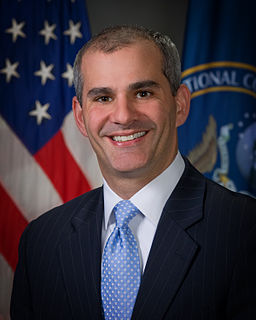A Quote by J. B. Pritzker
By legitimizing Iran's nuclear program, removing the pressure of economic sanctions, and allowing it to obtain conventional weapons and ballistic missiles, this agreement makes the prospect for war more likely, not less.
Related Quotes
We support any deal that denies Iran nuclear weapons, that has a continuous and robust inspection mechanism and that has snap-back provisions in case Iran violates the agreement. Our concern is that Iran will use the income it receives as a result of the lifting of the nuclear sanctions in order to fund its nefarious activities in the region.
Sanctions did indeed help to bring Iran to the negotiating table. But sanctions did not stop the advance of Iran's nuclear program. Negotiations have done that, and it is in our interest not to deny ourselves the chance to achieve a long-term, comprehensive solution that would deny Iran a nuclear weapon.
I think the danger right now is that without effective inspections, without effective monitoring, Iraq can in a very short period of time measured in months, reconstitute chemical and biological weapons, long-range ballistic missiles to deliver these weapons, and even certain aspects of their nuclear weaponization program.
Ultimately, the goal of sanctions is to ratchet up the economic pressure on the Iranians to such a level that the regime determines it is simply too great to bear, and they are forced to weigh the decision to carry on their nuclear development and their illicit quest for nuclear weapons against the ever-growing pressure from their own people.
Congress has a limited role in regards to the nuclear agreement with Iran. We do have a review statute that was enacted into law where we review Iran's compliance with the agreement, and we have certain requirements on the President to keep us informed. What we have seen so far is that Iran is in compliance with the nuclear part of the agreement, but certainly has violated non-nuclear issues.

































